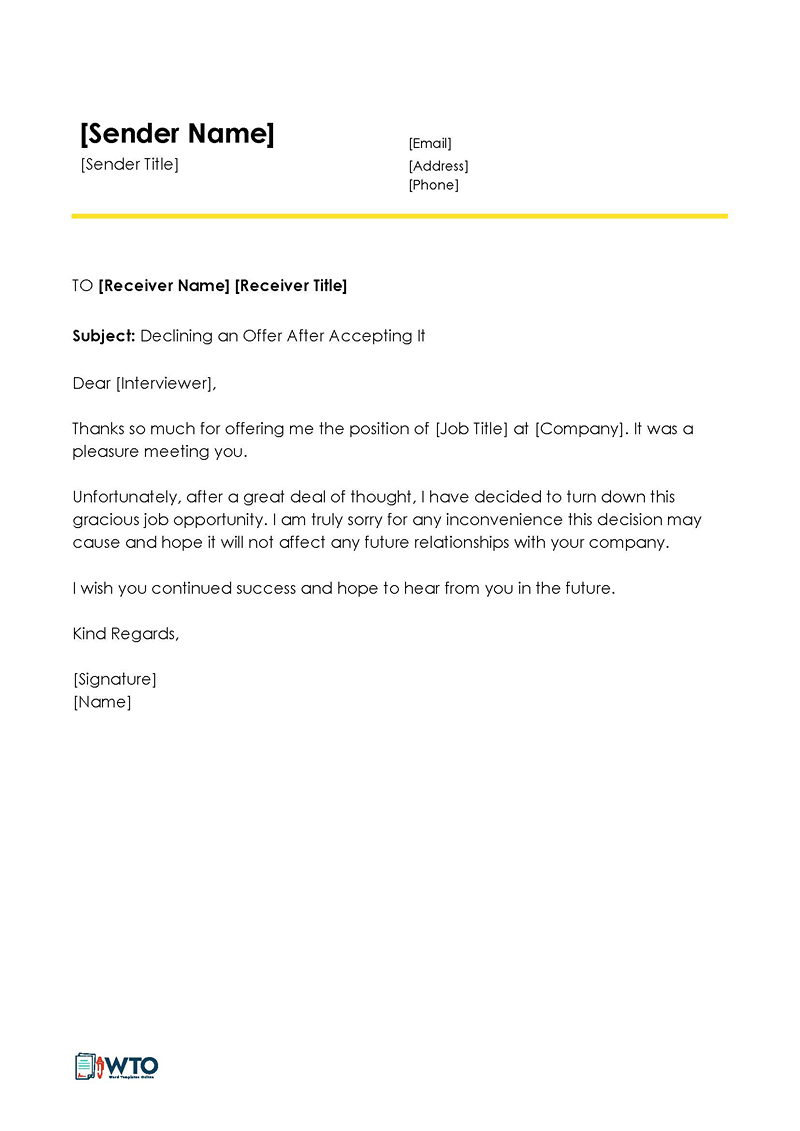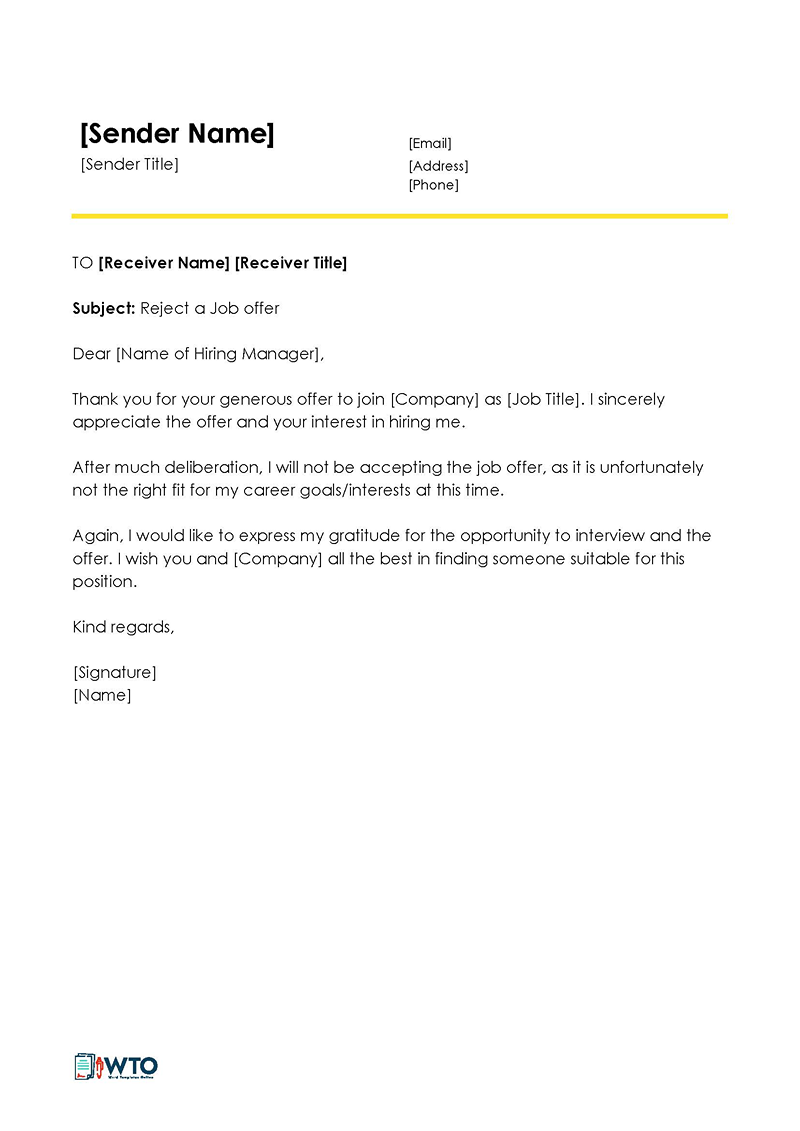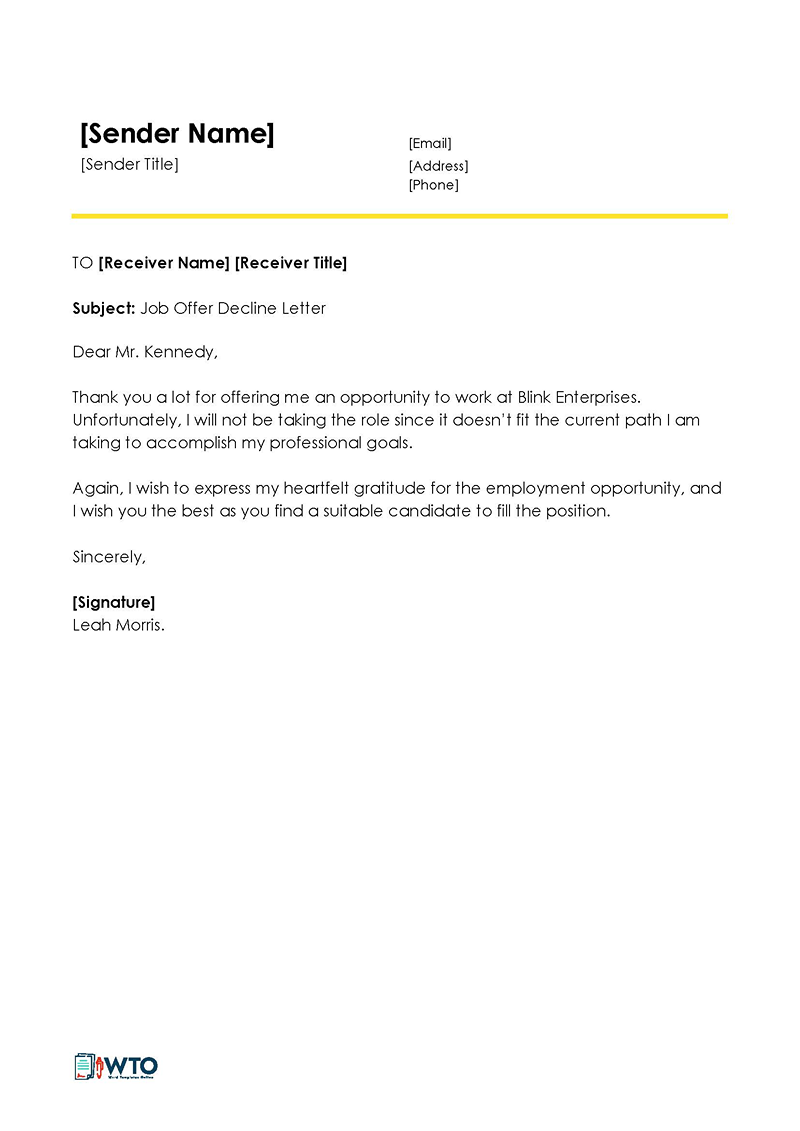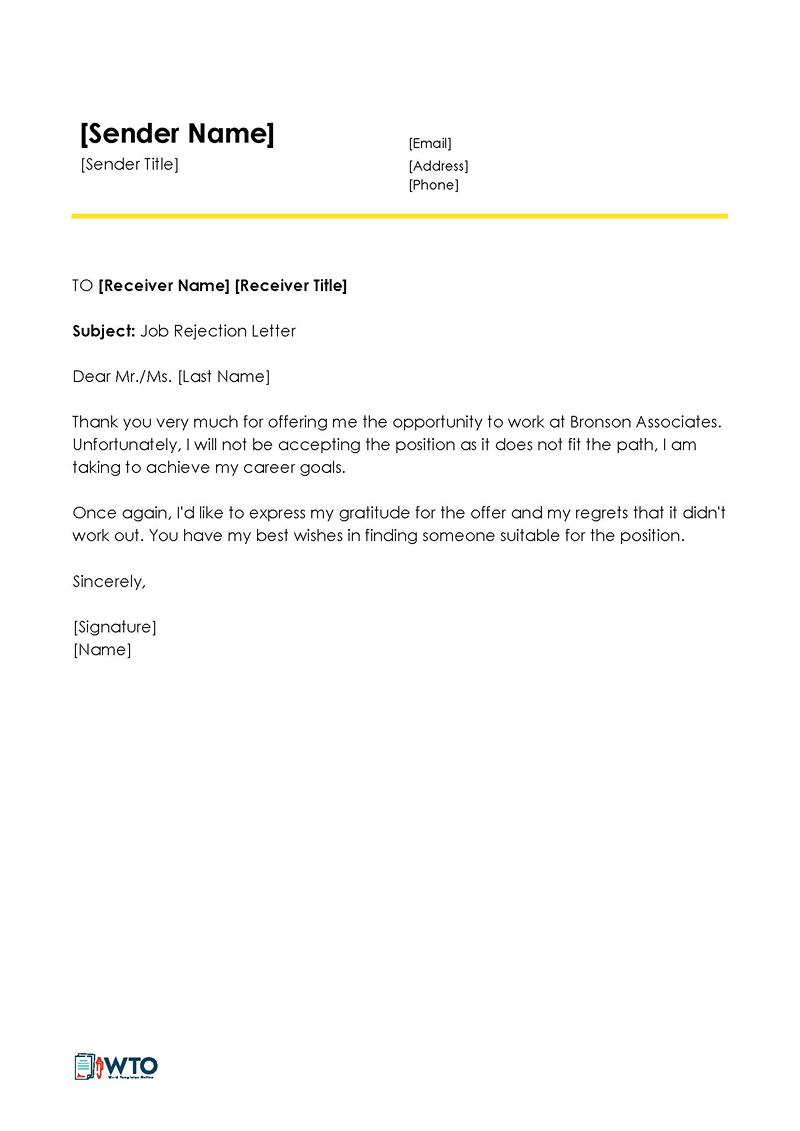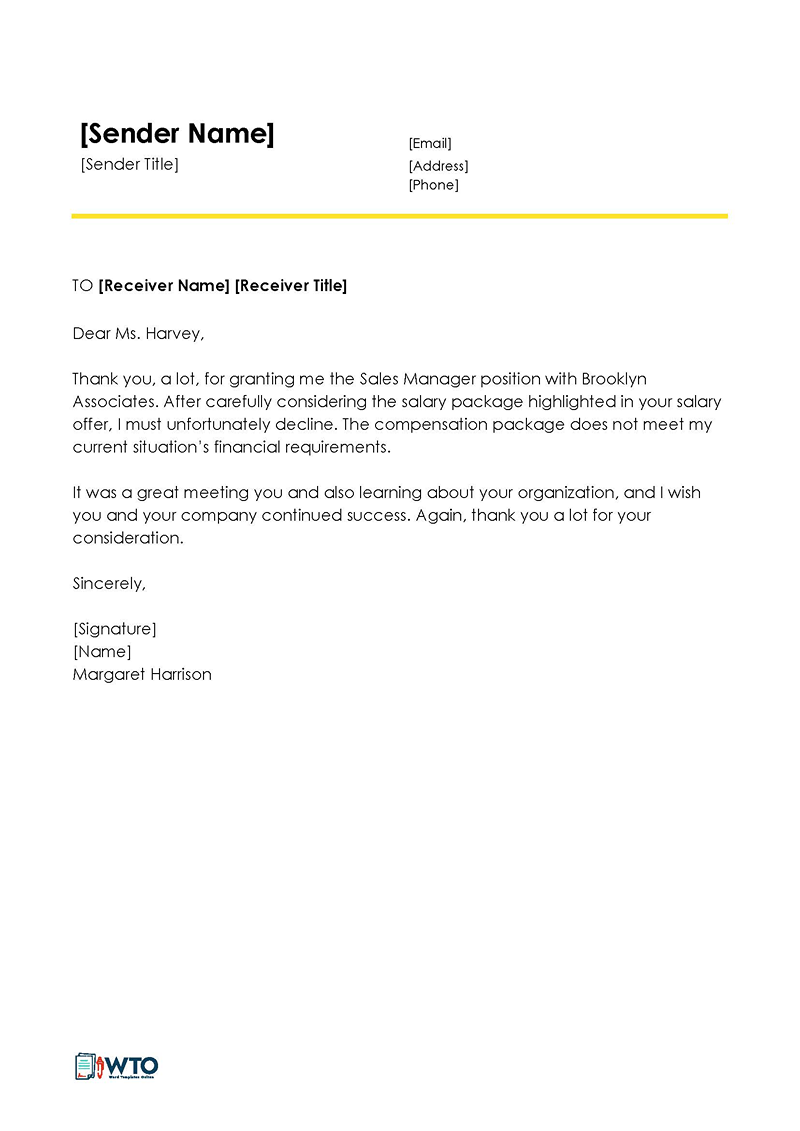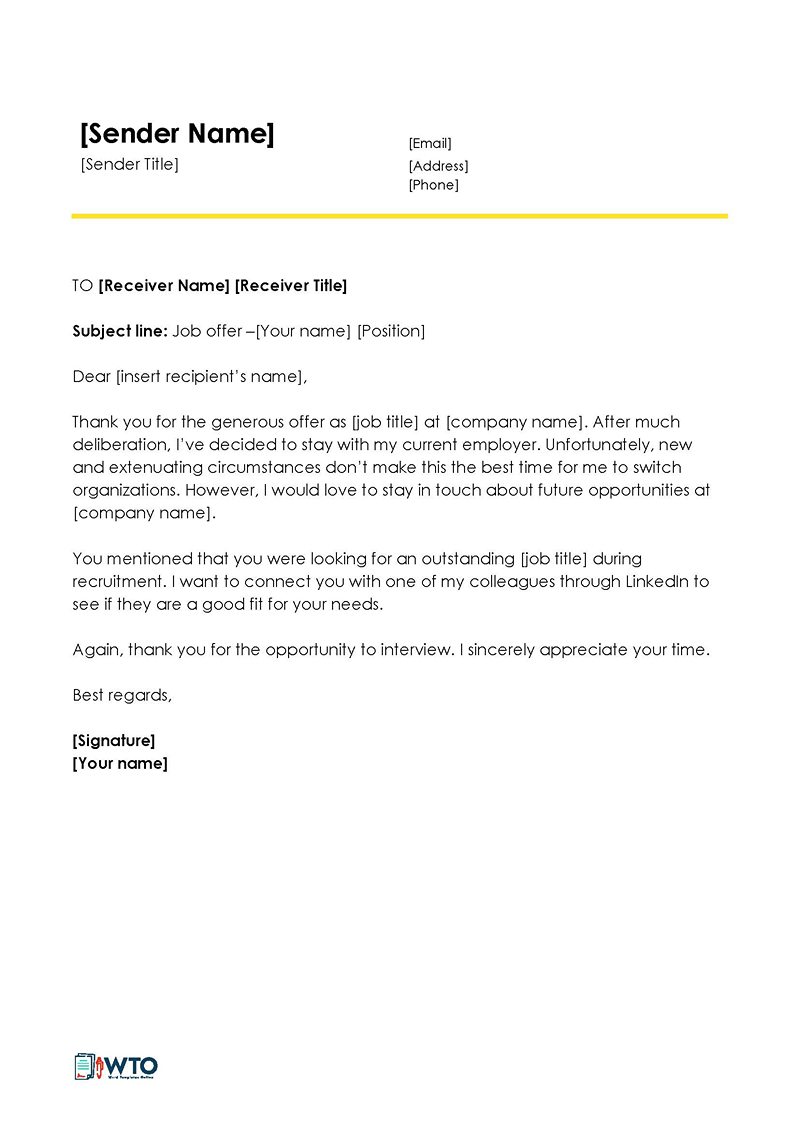It is a formal letter or document sent to a hiring manager or employer by a candidate to politely decline a job offer extended to them. It is also referred to as a declination letter. In it, the candidate expresses their appreciation for the offer and includes a respectful and courteous explanation of the reason for declining it.
Deciding to refuse a job offer is a delicate process, as mishandling it could harm your professional reputation. It is advisable to inform the hiring manager in writing about your stance as soon as possible. It should be clear that you have given the offer significant consideration but decided to reject it. Knowing how to draft it in a way that accurately conveys your appreciation for the consideration and your regrets is essential, especially if you have multiple offers.
You should communicate your decision in writing because this document is part of the official record. This helps preserve your relationship with the recipient. Choose your words carefully and remain respectful throughout. This not only projects you favorably to the recipient but also encourages them to consider you for future employment opportunities.
To help you draft a professional letter, this article will address the reasons that may necessitate its use and provide a step-by-step guide on how to draft it. Samples and templates have also been provided to assist you with the writing process.
Why Decline a Job Offer? Exploring Personal and Professional Reasons
When it comes to the job search process, receiving a job offer is undoubtedly an exciting moment. However, there may be instances where declining a job offer becomes necessary. Deciding to decline an offer requires careful consideration and evaluation of personal and professional factors.
Some of the reasons are the following:
Inadequate salary and benefits
You should know the appropriate salary range for the position before considering accepting it. Consider the position’s benefits, such as paid vacation, retirement benefits, and health insurance. You may reject the job offer if you consider that you are not being adequately compensated.
Personal circumstances
In a new work environment, you should prepare to invest more hours in familiarizing yourself with the company’s operations. However, accepting a position that requires you to work 70-80 hours per week is not the best decision if you have personal or family obligations. You might request remote working options or flexible hours, or the hiring manager may be willing to compensate for the long hours with paid vacation days. If they are unwilling to offer a favorable work and life balance, it is a valid reason to refuse a job offer.
Location and commute challenges
A job might become difficult if the commute to the workplace is lengthy and stressful. During the hiring process, pay close attention to the amount of time it takes to get to the workplace and determine if you are willing to do it twice a day for the length of your employment.
Before declining the offer, check for any adaptability to your work location and hours if you find the commute challenging. If not, even the perfect job may not be worthwhile if the commute affects your efficiency at work because of the distance and related stress.
Concerns about company culture and values
Company culture refers to the vision, mission, objectives, management style, and work environment, among other things. If you have thoroughly researched the company and found that its culture does not align with your own values, work preferences, or career goals, it may be a valid reason to decline the job offer. A poor cultural fit can impact job satisfaction, work-life balance, and overall job performance. It is important to prioritize your well-being and ensure that you will thrive in the work environment.
Other job opportunities
A valid reason for declining an offer is to accept a better offer. When you are presented with a more attractive opportunity, whether it is the salary, benefits, career growth, or other factors that are important to you, it is understandable to consider and potentially accept a better one.
When communicating your decision to decline the job position based on receiving a better offer, it is essential to express your gratitude for the original offer and acknowledge the positive aspects of the opportunity. You can mention that, after careful consideration and weighing your options, you have received another option that better aligns with your career goals, compensation expectations, or overall interests.
Doubts and reservations
It is essential to carefully assess the job offer, taking into consideration factors such as job responsibilities, work environment, company culture, and growth opportunities. If there are significant doubts or reservations about any of these aspects, it may be wise to decline it. It is crucial to prioritize one’s own career goals, personal values, and overall job satisfaction.
Lack of growth opportunities
Every position you take should enhance your résumé. Assess whether you will have opportunities such as increased responsibility, capacity development, and challenging projects before accepting a job offer. If the job does not offer clear prospects for professional development, career advancement, or skill enhancement, an individual may choose to explore other opportunities that provide better growth prospects.
Timing and pending offer
Timing plays a crucial role in the decision-making process when considering job offers. The presence of a pending offer can significantly impact an individual’s decision to decline an existing job offer. Several factors contribute to this decision, including the prioritization of preferred opportunities, the search for a better fit in terms of responsibilities and prospects, the consideration of salary and benefits, the focus on professional advancement, and the need to address personal circumstances. The pending offer holds the potential for a more favorable career path, increased compensation, improved work-life balance, or better alignment with personal commitments.
How to Write a Letter to Politely Refuse a Job Offer
If you have received a job offer you cannot accept due to any of the reasons outlined above, this article will now guide you on how to draft a respectful and polite letter to convey your decision.
Opening Paragraph: Express your gratitude for the offer
Begin by conveying your appreciation for being considered for the position and the effort spent by the recipient in the hiring process. Be polite and state that you regret declining the offer. Write in a tone that suggests you are willing to join the company in the future, should an opportunity present itself.
You may write this section as shown in the example below:
EXAMPLE
Thank you for the offer to join Vasik Labs as a Sales Representative. I appreciate your confidence in my abilities and your interest in hiring me. Regrettably, after careful consideration, I have chosen to decline this gracious offer.
Body paragraphs: What to include
In the body, give a reason for declining the offer, apologize for any inconvenience caused, and extend an offer to maintain contact in the future.
Reason for not accepting the offer
In this paragraph, explain your reason for not accepting the offer. Even though you do not have to share specifics, be straightforward and truthful. Remember to provide some context for your decision.
EXAMPLE
If you reject the offer due to a lengthy commute, mention where you will be commuting from and detail how challenging it would be to get to the workplace.
However, if you have personal reasons for declining, you do not have to share those reasons. The company can use this feedback to improve its recruitment processes.
You may express it as shown in the example below:
EXAMPLE
During the interview process, I had the opportunity to learn more about the company culture and the responsibilities associated with the role. While I am impressed by the work done at [Company Name], I realize that there might be a mismatch between my work style and the expectations of the position.
Apologize for any inconvenience
The recruiting process is tedious and time-consuming for companies. Most likely, the hiring organization dedicated multiple resources during the hiring process, from reviewing applications to evaluating sample projects and arranging interview panels. By acknowledging the time and effort invested by the hiring manager and the company, you demonstrate professionalism and show that you value their consideration.
EXAMPLE
I am sure the position presents massive potential for the right candidate. I regret any inconvenience I may have caused you and sincerely apologize.
Be willing to maintain contact
Just because you are declining an offer does not mean the organization will not consider you for other opportunities in the future. Offer to maintain communication by providing additional contact information if you develop a positive relationship with the hiring manager during the recruitment process. However, you should not feel compelled to provide this information.
EXAMPLE
Feel free to contact me if any opportunities become available. You can reach me at (225) 400-9715.
Closing paragraph: Reiterate gratitude for the opportunity
Finally, conclude your letter by politely reiterating your gratitude for being considered for the position and your best wishes for the organization. Your name should be followed by a respectful closing salutation. Sign to validate its authenticity. A polite sign-off helps maintain a positive relationship for future engagements.
EXAMPLE
Thank you once more for your consideration. I understand this decision may be disappointing, and I wish you well as you search for the ideal candidate.
free templates
[Your Name]
[Your Address]
[City, State, Zip Code]
[Phone Number]
[Email Address]
[Date]
[Employer’s Name]
[Employer’s Title]
[Company’s Name]
[Company’s Address]
[City, State, Zip Code]
Dear [Employer’s Name],
I hope this letter finds you well. I am writing to express my sincere gratitude for the offer of [Position Title] at [Company’s Name]. After careful consideration, I have decided to decline the offer. This decision was not made lightly, but after evaluating my current career goals and personal circumstances, I believe it is the best choice for me at this time.
I want to extend my deepest thanks to you and your team for considering me for this opportunity. I am truly honored to have been selected and am impressed by the professionalism and kindness shown by everyone I interacted with during the interview process. [Company’s Name] clearly has a remarkable team, and I have no doubt that the organization will continue to achieve great success.
Please understand that my decision is based on personal reasons and in no way reflects any dissatisfaction with the offer or the company. It was a difficult choice, given the attractive aspects of the position and [Company’s Name].
I hope to have the opportunity to cross paths with you and [Company’s Name] in the future. I wish you and the team all the best and thank you once again for this offer and for the time and consideration extended to me.
Sincerely,
[Your Name]
Sample Letters to Decline a Job Offer
When writing a declination letter, the wording should be based on your reason for rejecting the offer.
Here are some samples you may refer to:
Due to inadequate salary
Dear Mr. Davis,
I hope this letter finds you well. I would like to express my sincere gratitude for offering me the position of Software Developer at Tech Innovations Inc. I am truly honored by the opportunity to become a part of such a dynamic and innovative team. After much deliberation, however, I have made the difficult decision to decline the offer due to the salary package.
Please understand that this decision was not made lightly. I have spent considerable time evaluating the offer in the context of my financial requirements and career aspirations. Despite my enthusiasm for the role and the company, the offered salary does not meet my current needs, considering my professional experience and the industry standards.
I want to emphasize my admiration for Tech Innovations Inc. and the professionalism of your team throughout the interview process. It has been a pleasure learning more about your company’s vision and projects, which only increased my respect for what you are achieving in the industry.
While I must decline this offer, I remain very interested in the possibility of working with Tech Innovations Inc. in the future, should there be an opportunity more aligned with my salary expectations. I believe strongly in the company’s direction and would welcome the chance to contribute to your team under different circumstances.
Thank you once again for this offer and for understanding my position. I wish Tech Innovations Inc. continued success and hope to cross paths under more favorable conditions.
Sincerely,
Olivia Smith
To accept another offer
Dear Ms. Rodriguez,
I hope this message finds you well. I am writing to extend my sincerest gratitude to you and your team at Creative Solutions Ltd. for offering me the position of Graphic Designer. I am truly honored by the confidence you have shown in my abilities and the opportunity to contribute to your esteemed company.
After much consideration and with a heavy heart, I must inform you that I have decided to decline the offer. Since our last conversation, I have received another job offer that aligns more closely with my long-term career objectives and personal circumstances. This decision was incredibly difficult to make, given my high regard for Creative Solutions Ltd. and the exciting prospects the role presents.
I want to express my deepest appreciation for the time and effort you invested in the interview process and for considering me for this position. I have gained a great deal of respect for the innovative work your company is doing, and I am genuinely disappointed to miss the chance to be part of such a dynamic team.
Please convey my thanks to everyone involved for their warm welcome and the opportunity to learn more about Creative Solutions Ltd. I hope that our paths might cross again in the future under different circumstances, and I look forward to potentially collaborating in some capacity.
Thank you once again for your understanding and for this incredible offer. I wish Creative Solutions Ltd. all the best and continued success in all its endeavors.
Warmest regards,
Nathan Kim
Lack of professional fit
Dear Ms. Lee,
I hope this letter finds you well. I want to start by expressing my sincere gratitude for the opportunity to interview for the position of Senior UX Designer at Innovatech Designs. I am truly honored to have been considered for a role within such a reputable and innovative organization.
After much thought and consideration, I have decided to decline the job offer. This decision was not easy, and it took considerable reflection on what I am seeking in my next professional chapter. My decision is based on the alignment of the role with my career goals and the type of projects I am passionate about pursuing. While Innovatech Designs is a fantastic company, I feel that the specific position offered does not perfectly align with my current professional aspirations and the direction I wish to take my career.
Please know that this decision does not reflect my view of Innovatech Designs or the quality of your team, both of which I hold in high regard. It has been a pleasure to learn more about your company and to meet several of your talented team members through the interview process. I am truly impressed by the work you do and have no doubt that Innovatech Designs will continue to achieve great success.
I am grateful for the time and consideration you have extended to me and hope that we might cross paths again in the future under different circumstances. Thank you once again for this offer and for understanding my position.
I wish you and Innovatech Designs the very best moving forward and hope to perhaps collaborate in some capacity in the future.
Warmest regards,
Mia Patel
Analysis
The letters effectively convey the decision of the recipients regarding the job offers they received. Each letter is polite, appreciative, and transparent in communicating the reasons for declining the offer. In the first letter, the sender declines due to inadequate salary, emphasizing the importance of financial considerations and expressing interest in future opportunities with the company. Similarly, the second letter declines due to accepting another offer that aligns better with the recipient’s career objectives, while expressing gratitude for the offer and expressing hope for potential future collaborations. Lastly, the third letter declines the offer due to a lack of professional fit, highlighting the importance of career aspirations and the role’s alignment with them, while maintaining respect for the company and its team. The senders express gratitude for the opportunity, convey respect for the company and its team, and often express hope for potential future collaborations or opportunities at the end of the letters. They maintain a positive tone throughout, despite declining the offer, and leave the door open for potential future interactions. This ensures that the relationships remain intact and professional, while also acknowledging the value of the opportunity presented.
Overall, each letter effectively communicates the decision while maintaining professionalism and leaving the door open for potential future opportunities or collaborations.
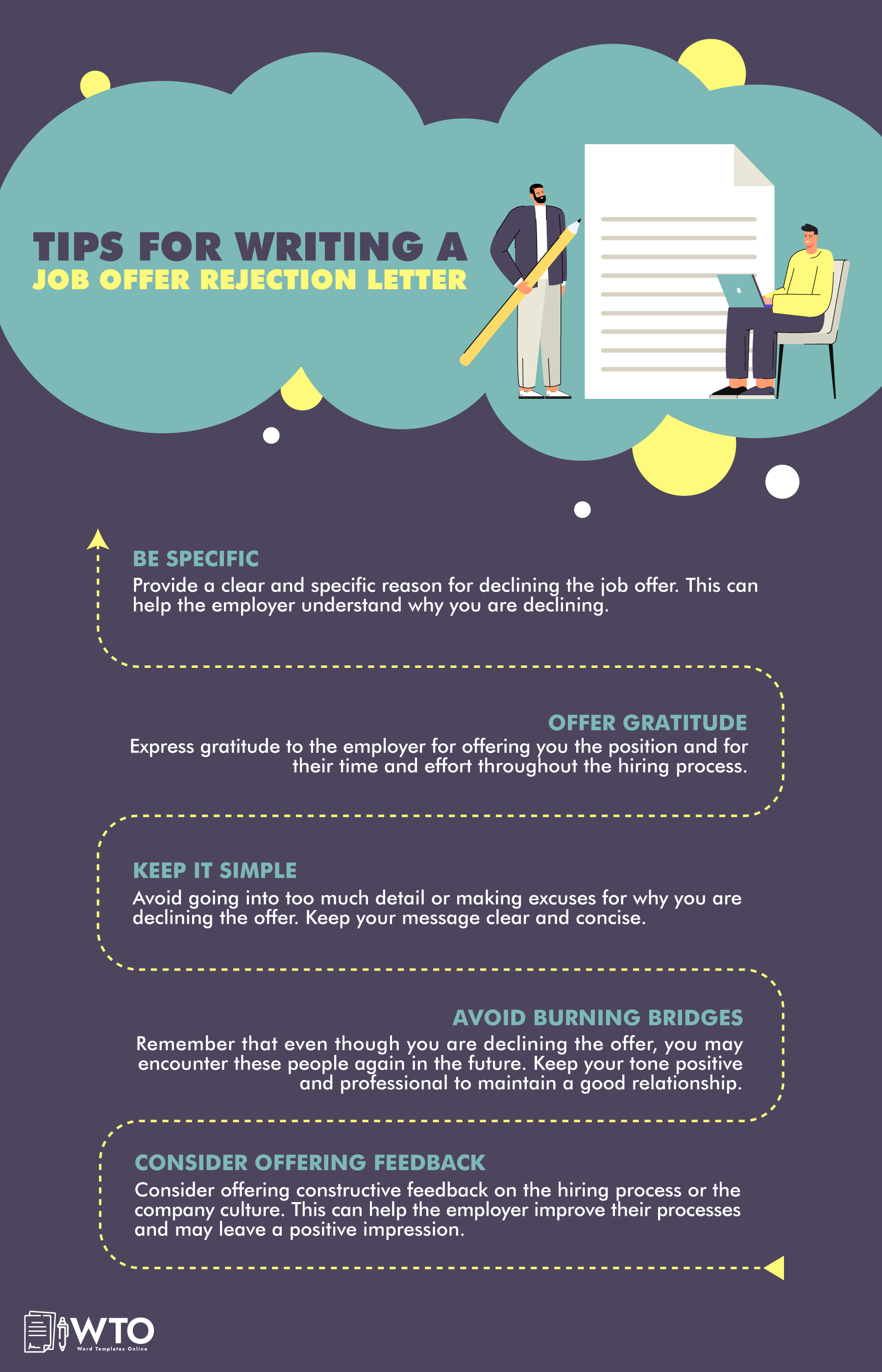
Free Templates
Summary
In the professional realm, receiving a job offer is often an exciting and rewarding experience. However, there may be instances when accepting it is not the best decision for various reasons. In such cases, it is essential to handle the situation with tact and professionalism by writing a well-crafted declination letter. This article explains the significance of writing it, highlighting the importance of maintaining professionalism and gratitude throughout the correspondence. It discusses common reasons for declining job offers, such as cultural or job mismatch, pending offers, and better opportunities. Furthermore, it provides a step-by-step guide to crafting a well-structured and thoughtful declination letter. You may also download one of our free templates and customize it to your preferences. Send the document as soon as possible, and remember to thank the hiring manager for considering you for the role.
